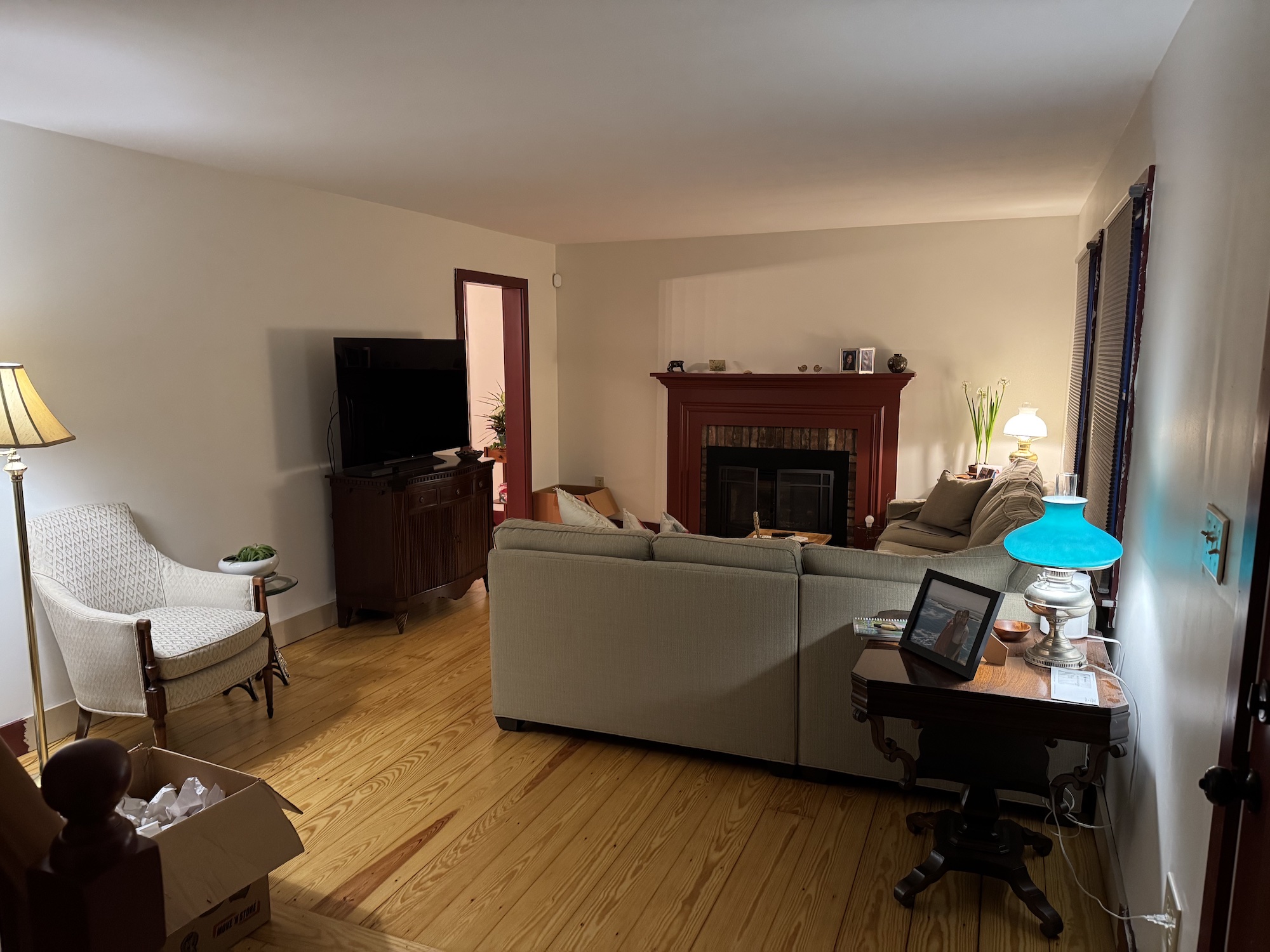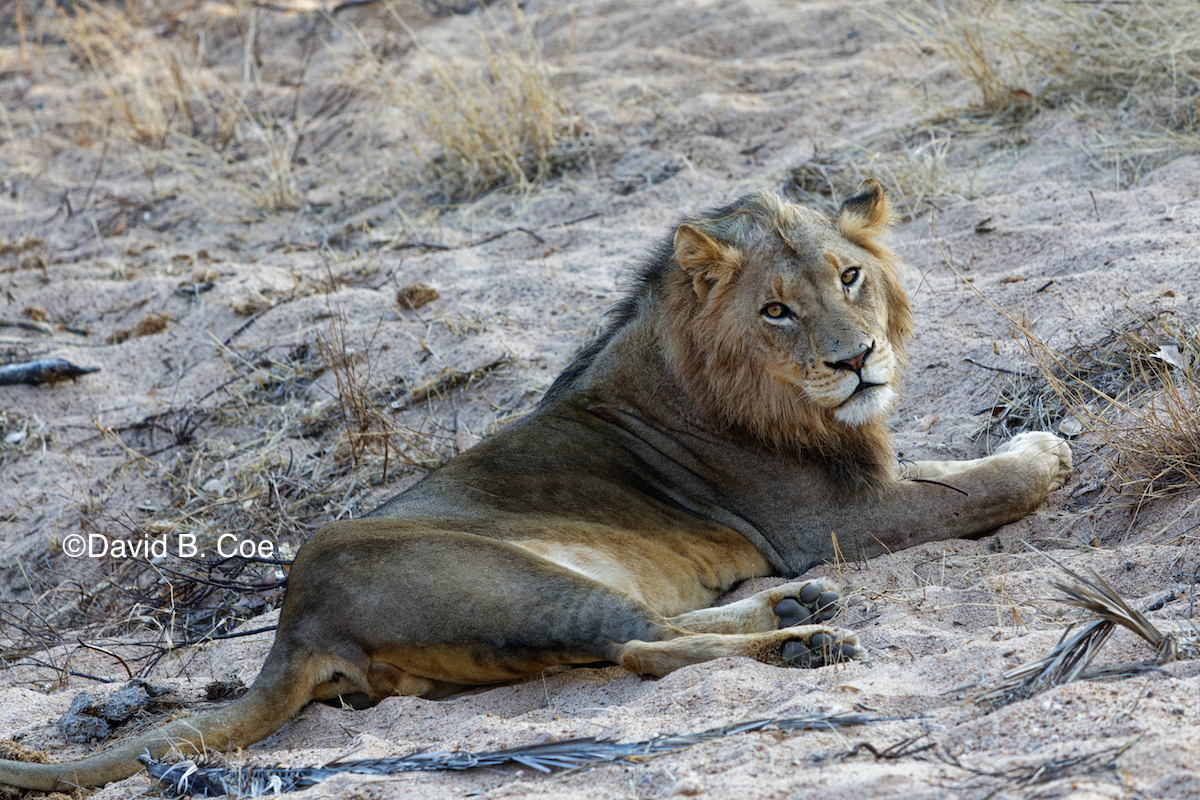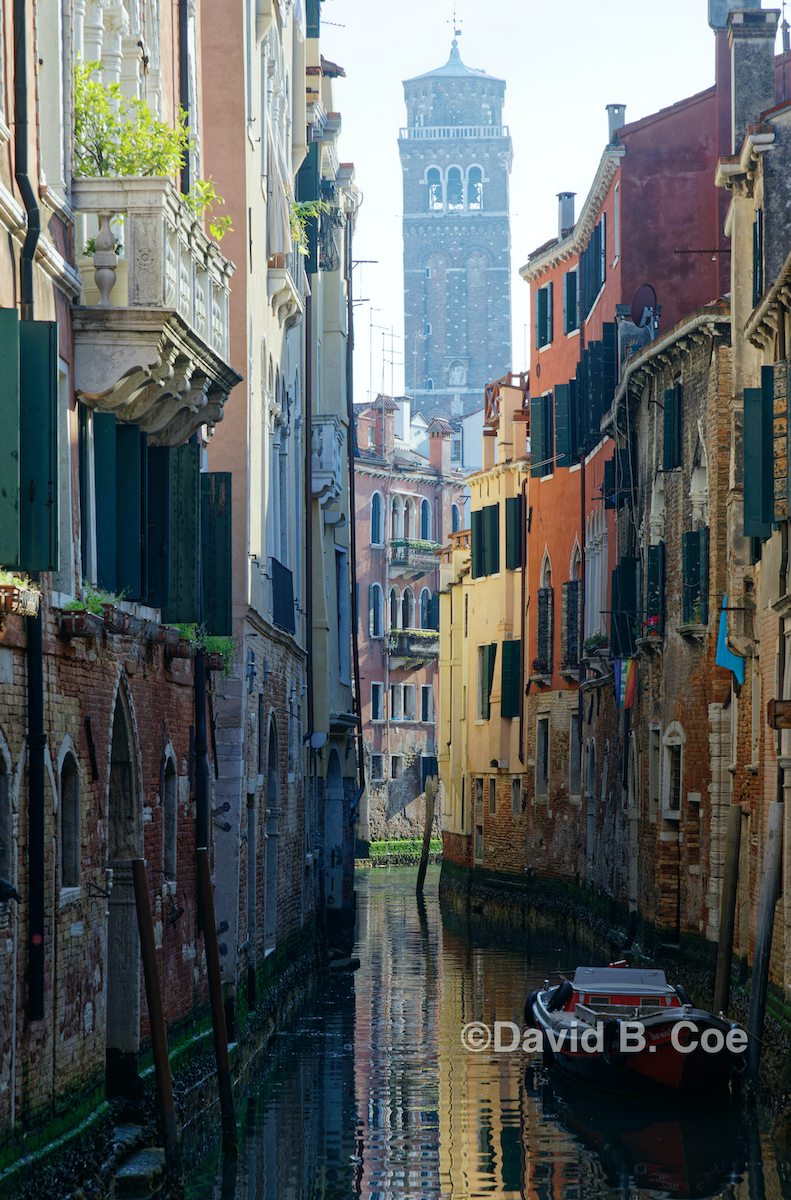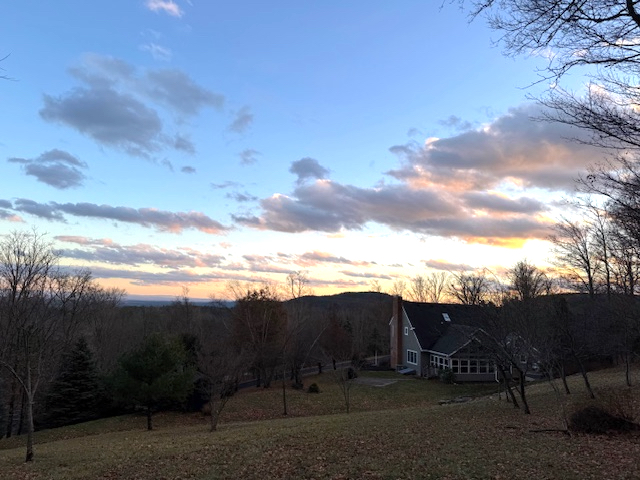This past weekend marked my Gram’s birthday. I won’t tell you how old she would have been because, well, I’m not sure I can do the math. Old. Really old. She passed away in 1983, and at the time she was just shy of her 92nd birthday. I think. I’m pretty sure she would be, like, 134 now. I am also pretty sure she would be ticked at me for telling you how old she would be . . . .
Gram was a wonderful grandmother. She adored all of her grandkids and she doted on us in all the grandmotherly ways. She made a huge fuss over every achievement, she always wanted to hear all about our lives, our friends, our classes at school. I never knew my mother’s parents, and my grandfather on my father’s side was not really part of our lives growing up. But it didn’t matter, because Gram showered us with enough love for four grandparents.
 Clara Bartels was born in Amsterdam and came to the United States as a small child. Her father was a diamond cutter, and diamond cutters were in great demand in the diamond district of New York City. She grew up around the block from Jacques Cohen, who later in life changed the family’s last name to Coe, and whose father also was a diamond cutter who emigrated from Amsterdam. They would marry, have three kids, and then divorce, bitterly, at a time when divorce was not really something people were supposed to do.
Clara Bartels was born in Amsterdam and came to the United States as a small child. Her father was a diamond cutter, and diamond cutters were in great demand in the diamond district of New York City. She grew up around the block from Jacques Cohen, who later in life changed the family’s last name to Coe, and whose father also was a diamond cutter who emigrated from Amsterdam. They would marry, have three kids, and then divorce, bitterly, at a time when divorce was not really something people were supposed to do.
Gram endured a lot in those years. She raised three children by herself, when single mothers with children were expected to remarry with alacrity. She nearly lost my father to meningitis when he was a sophomore in college. The youngest of her kids, my Uncle Bill, died in France during World War II. But she was a survivor and much tougher than anyone would have thought just looking at her.
Clara was maybe — MAYBE — five feet tall. With shoes on. In a stiff tail wind . . . . She had dark hair early in life. When I knew her, she had beautiful, silky white hair. Her smile could power entire cities. Her laugh, which we heard frequently, sounded like a car engine struggling to turn over. She had a terrific sense of humor and loved to laugh when she wasn’t supposed to. Each year, we would go to my Aunt Jean’s house for Passover, and my Uncle Bud would lead the Seder. He was more religious than the rest of us, and he took the Passover rites fairly seriously. And so when Gram would laugh at one thing or another in the Haggadah (which she did every year), he would grow annoyed. Which only served to make her laugh more. Which annoyed him a little more. Which increased her laughter yet again, making the rest of us laugh. Etc. Etc. I loved my uncle. He was a sweet, generous man. And for most of the year, he adored Gram. He always tried to be a good sport during Passover, but Gram didn’t make it easy . . . .
Staying with Gram was a treat. When I was young, whenever my parents went away, I would stay with her in her apartment on the east side of Manhattan. 245 East 63rd Street. The address is seared into my brain. So is her apartment number: 1104. It was a beautiful apartment — I shudder to think what it would cost today — and yet it was a pale substitute for the apartment my older siblings and cousins remember from when they stayed with her. That one was near Central Park and was huge and gorgeous. But no matter where she lived, when we stayed with her we had her all to ourselves. She would make the foods we liked, would take us to Atlantic Beach during the summer, or during the colder months, would take us FAO Schwarz, the famous toy store (the Tom Hanks-Robert Loggia floor-piano scene from Big was filmed there). We would walk with her there, and would be allowed to pick out any (reasonably priced) toy we wanted. After, we would get an ice cream at Schraffts.
Gram wasn’t always the easiest personality. She could be stubborn and even prickly on occasion. The summer after my senior year in college, my folks went away for a couple of weeks, and I stayed alone at our house. (At this point, I hadn’t stayed overnight at Gram’s for several years.) But my dad asked me to call Gram while they were away and I forgot. My high school girlfriend and I were going through a rough patch, and I had friends I wanted to see, and, well, I was a teenager . . . . It was entirely my fault. I know that.
But Gram was really angry with me. So angry that one night, when she and I had dinner at my aunt and uncle’s house, she wouldn’t speak to me. Literally. She directed all her questions and comments to me through my Aunt Jean, who reluctantly served as intermediary, and who later offered her heartfelt sympathy.
Lesson learned. When I went off to college, I made a point of calling Gram every Sunday, no matter what. And at the end of my freshman year, she commented to my father that Brown was a very good place for me. It had taught me responsibility. You can’t make this stuff up.
But episodes of that sort were the exceptions. Most of the time, Gram was fun, loving, silly, and totally engaged in all of our lives. She was, as I have said, a wonderful grandmother. To this day, I miss her laugh, and can hear it in my head when something funny happens.
Happy Birthday, Gram. I love you.











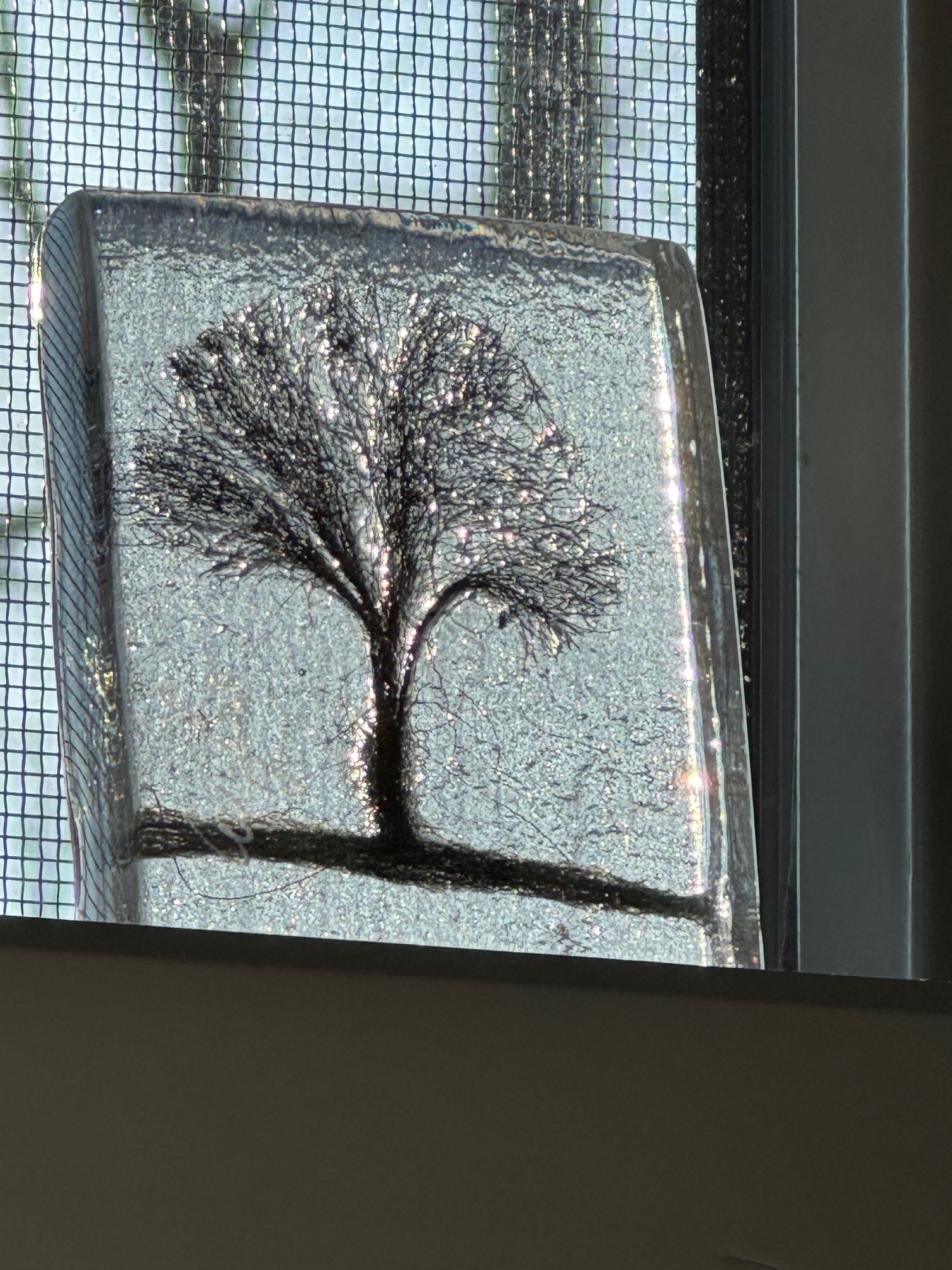 I kept it wrapped up even after we returned to the States. My plan was to open it once we were in our new house, which is what I did. It now sits in my office window, catching the late afternoon sun. And it reminds me of so much. That trip to Italy, which marked the beginning of my personal recovery from the trauma of losing Alex. That day in Venice, which was gloriously fun. The conversation with the kind shopkeeper, whose love for and pride in his father was palpable throughout our exchange. More, that little glass piece is an image of winter, and it sparkles like a gem when the sun hits it. It reminds me that even after a long cold winter, a time of grief and pain, there is always new life and the joy of a new spring.
I kept it wrapped up even after we returned to the States. My plan was to open it once we were in our new house, which is what I did. It now sits in my office window, catching the late afternoon sun. And it reminds me of so much. That trip to Italy, which marked the beginning of my personal recovery from the trauma of losing Alex. That day in Venice, which was gloriously fun. The conversation with the kind shopkeeper, whose love for and pride in his father was palpable throughout our exchange. More, that little glass piece is an image of winter, and it sparkles like a gem when the sun hits it. It reminds me that even after a long cold winter, a time of grief and pain, there is always new life and the joy of a new spring.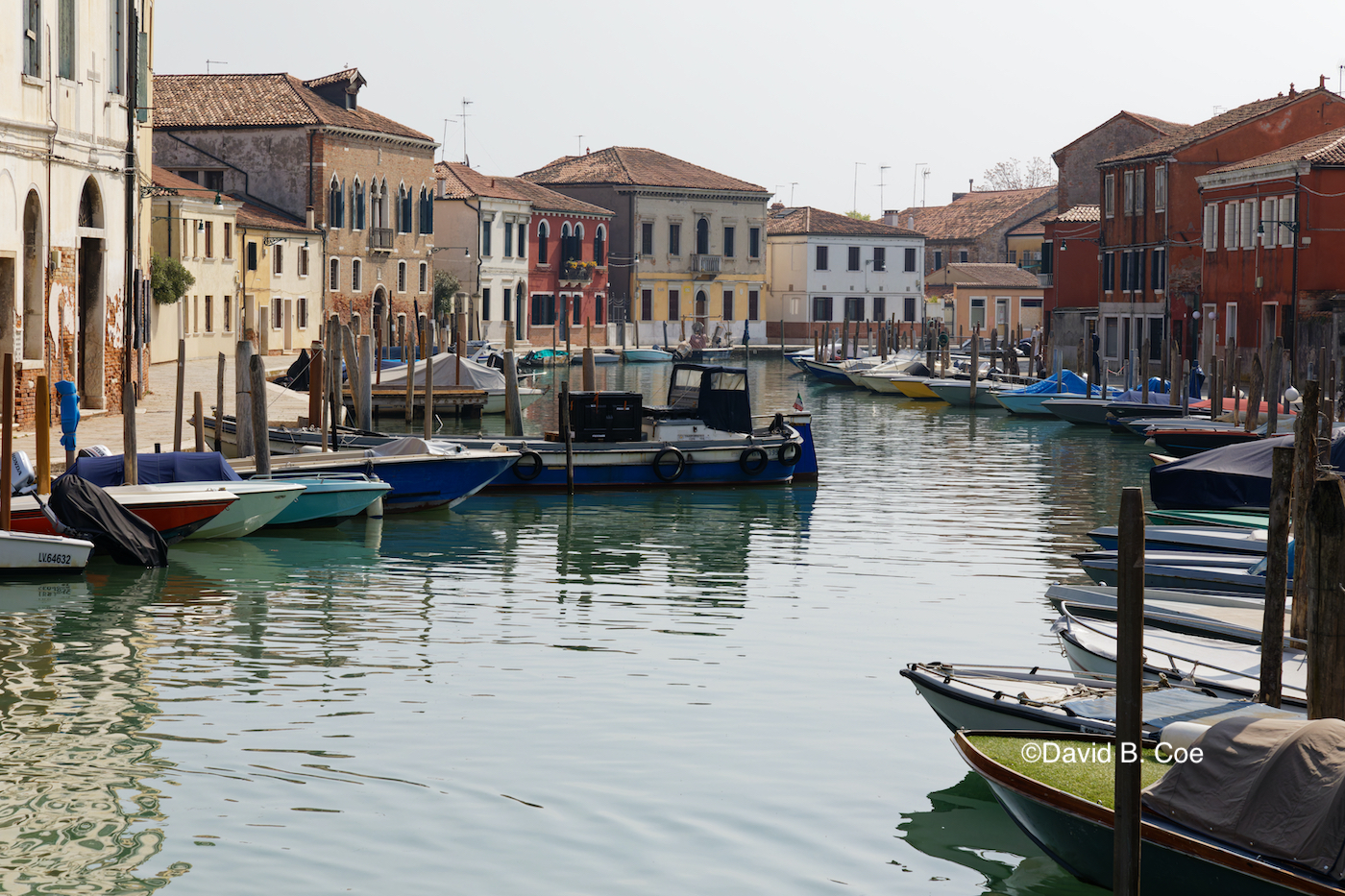 A cliché, to be sure. But as with so many clichés, it’s rooted in truth.
A cliché, to be sure. But as with so many clichés, it’s rooted in truth. What qualities make a villain compelling? I intend to dive into that. Who are some of my favorite villains? I’ll get into that, too. But let me offer a few quick points up front. I don’t think much of the all-powerful-evil-through-and-through villains one often encounters in the fantasy genre. Sauron, for instance — the evil god whose world-conquering designs lie at the heart of J.R.R. Tolkien’s The Lord of the Rings — is, to my mind, a very boring villain. He’s really powerful, and he’s really, really evil. And yes, he’s cunning, which is a point in his favor, and he’s scary (or his minions are). But beyond that, and unless one has gone back and read all his backstory in The Silmarillion, there isn’t really much to him. He lacks dimension and complexity.
What qualities make a villain compelling? I intend to dive into that. Who are some of my favorite villains? I’ll get into that, too. But let me offer a few quick points up front. I don’t think much of the all-powerful-evil-through-and-through villains one often encounters in the fantasy genre. Sauron, for instance — the evil god whose world-conquering designs lie at the heart of J.R.R. Tolkien’s The Lord of the Rings — is, to my mind, a very boring villain. He’s really powerful, and he’s really, really evil. And yes, he’s cunning, which is a point in his favor, and he’s scary (or his minions are). But beyond that, and unless one has gone back and read all his backstory in The Silmarillion, there isn’t really much to him. He lacks dimension and complexity. Some of my favorite villains from my own work? Quinnel Orzili from the Islevale Cycle (Time’s Children, Time’s Demon, Time’s Assassin), Saorla from the second and third books in The Case Files of Justis Fearsson, and, my absolute favorite, Sephira Pryce from the Thieftaker books. Yes, she later become something other than a pure villain, but that was basically because she became SO much fun to write that I had to find a way to keep her around and relevant.
Some of my favorite villains from my own work? Quinnel Orzili from the Islevale Cycle (Time’s Children, Time’s Demon, Time’s Assassin), Saorla from the second and third books in The Case Files of Justis Fearsson, and, my absolute favorite, Sephira Pryce from the Thieftaker books. Yes, she later become something other than a pure villain, but that was basically because she became SO much fun to write that I had to find a way to keep her around and relevant.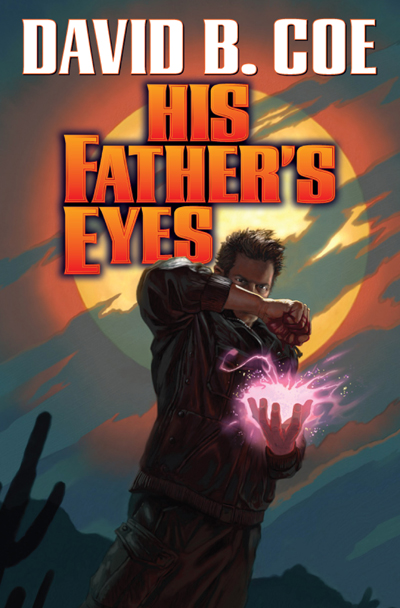 My favorite villains in the work of others? I already mentioned Brandan of Ygrath. John Rainbird, from Stephen King’s masterpiece, Firestarter, is a terrific villain. Smart, brutal, and yet also human. In Catie Murphy’s marvelous Negotiator trilogy there are two supernatural “bad guys,” Daisani and Janx, whose personal rivalry threatens the fabric of the mortal world. Their mutual animus and their own needs and desires humanize them and make them terrific foils for Magrit Knight, the series’ protagonist. And I would add that a certain writer I care not to mention in light of recent revelations has created some truly amazing villains. Too bad he wound up being a villain worthy of his own undeniable storytelling talents.
My favorite villains in the work of others? I already mentioned Brandan of Ygrath. John Rainbird, from Stephen King’s masterpiece, Firestarter, is a terrific villain. Smart, brutal, and yet also human. In Catie Murphy’s marvelous Negotiator trilogy there are two supernatural “bad guys,” Daisani and Janx, whose personal rivalry threatens the fabric of the mortal world. Their mutual animus and their own needs and desires humanize them and make them terrific foils for Magrit Knight, the series’ protagonist. And I would add that a certain writer I care not to mention in light of recent revelations has created some truly amazing villains. Too bad he wound up being a villain worthy of his own undeniable storytelling talents. What else have I got? Several years back, while attending a World Fantasy Convention, I bought signed prints of
What else have I got? Several years back, while attending a World Fantasy Convention, I bought signed prints of  We have a few nice pieces of art that once belonged to my parents. We have photos we purchased just outside of Zion National Park — photos of the park taken by photographer
We have a few nice pieces of art that once belonged to my parents. We have photos we purchased just outside of Zion National Park — photos of the park taken by photographer 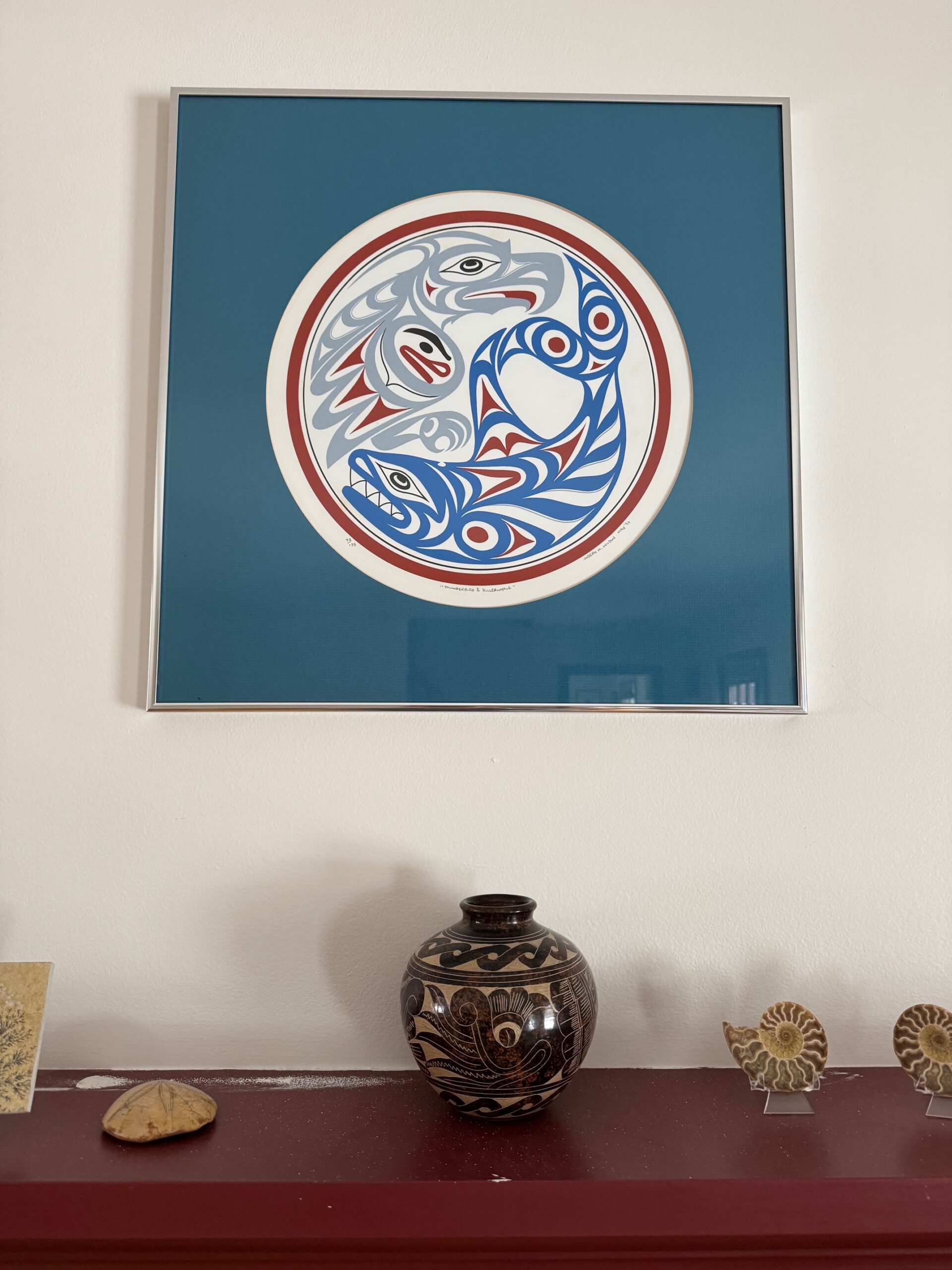 Of course, we have tons of smaller photos all around the house, of our darling daughters, of our parents and siblings, of friends, of our wedding.
Of course, we have tons of smaller photos all around the house, of our darling daughters, of our parents and siblings, of friends, of our wedding.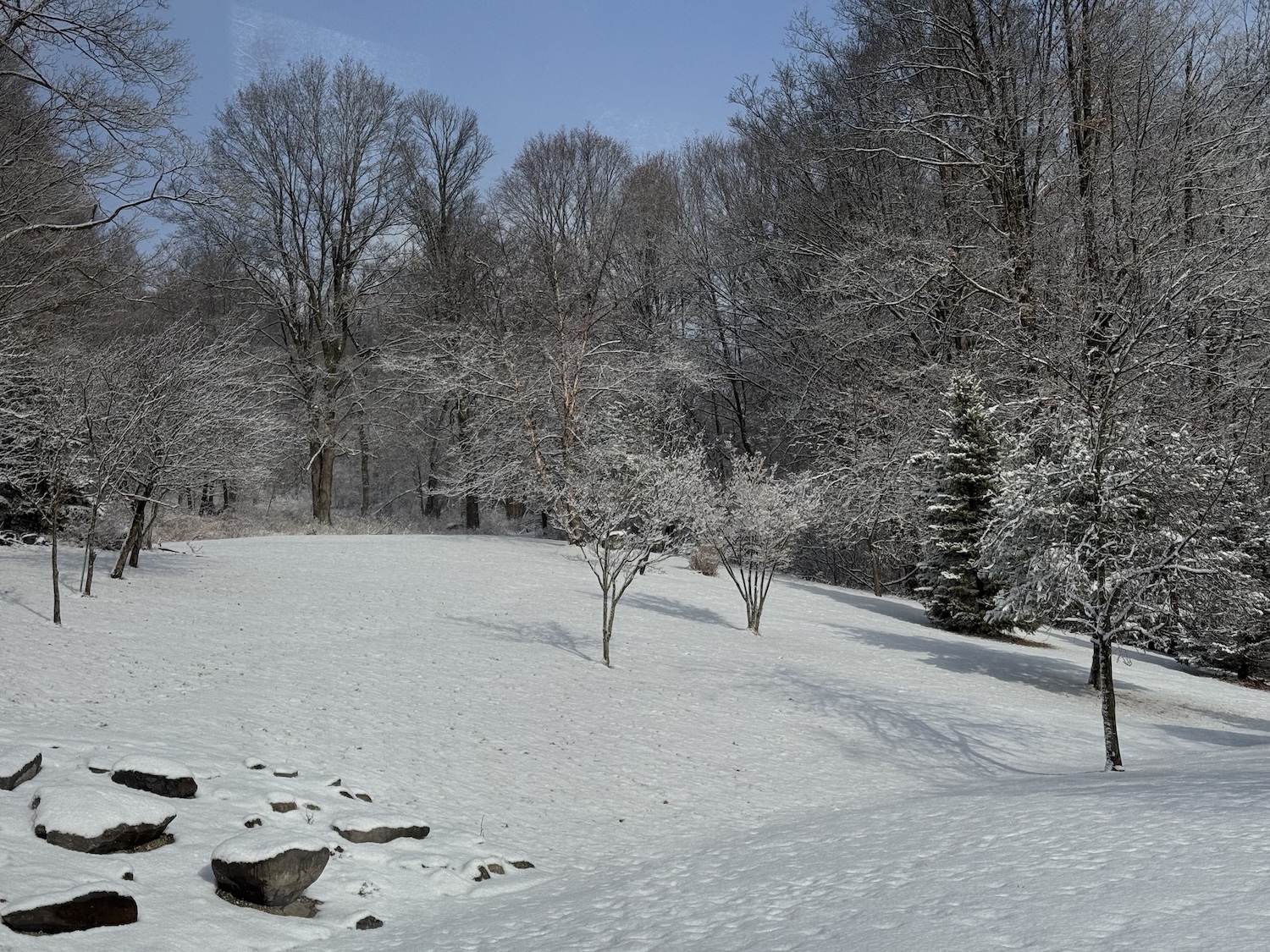
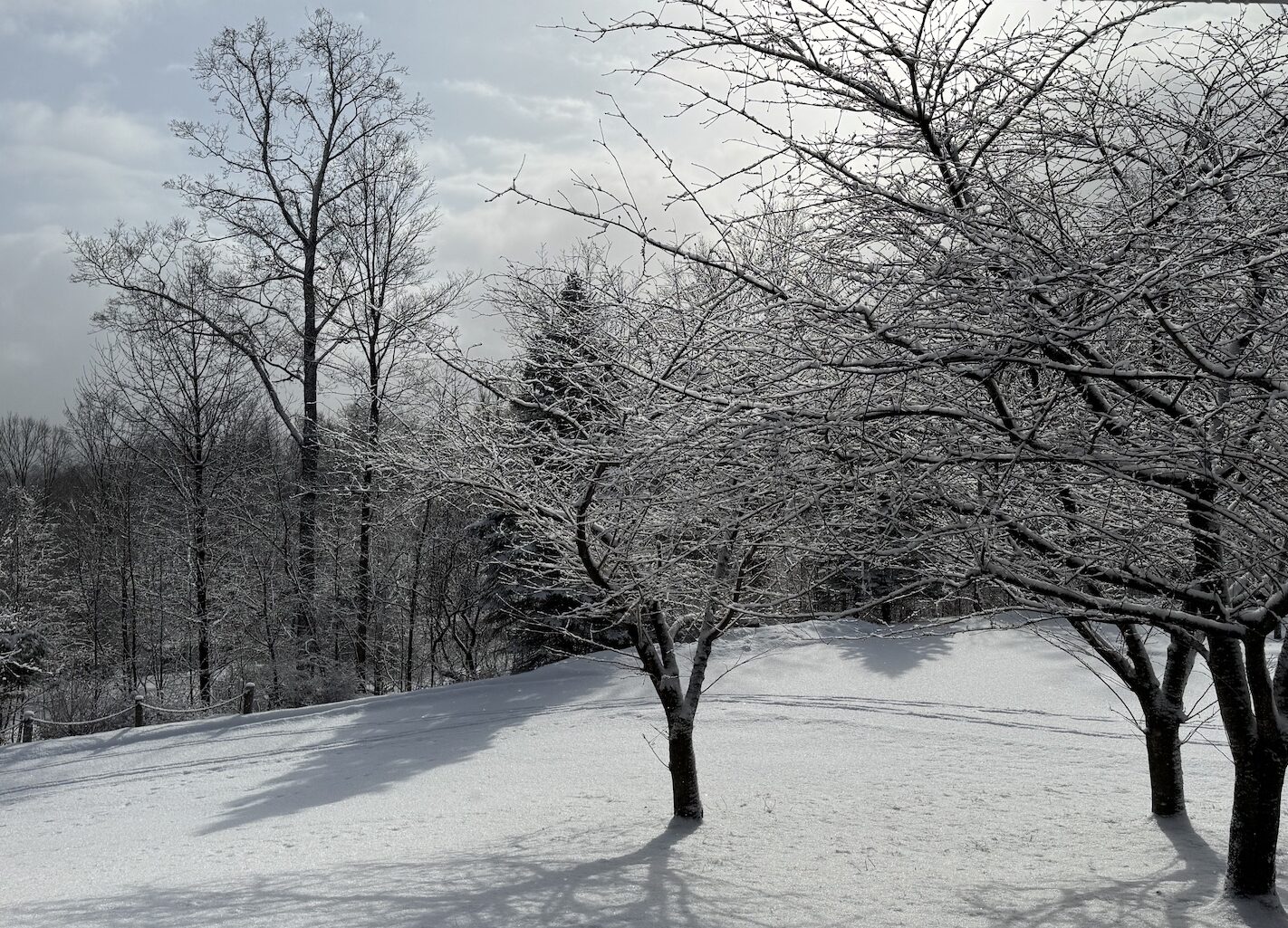 We woke this morning to a snow squall, something that happened with ever-decreasing frequency during our years in Tennessee, as climate change made the warm South even warmer. Here in New York, during the winter months, snow is still the default when there’s precipitation, and I love that. I have missed snow and don’t mind paying the plow guy or dealing with snow on the walkways and driveway. The beauty of an early morning snowfall more than makes up for the inconveniences.
We woke this morning to a snow squall, something that happened with ever-decreasing frequency during our years in Tennessee, as climate change made the warm South even warmer. Here in New York, during the winter months, snow is still the default when there’s precipitation, and I love that. I have missed snow and don’t mind paying the plow guy or dealing with snow on the walkways and driveway. The beauty of an early morning snowfall more than makes up for the inconveniences.